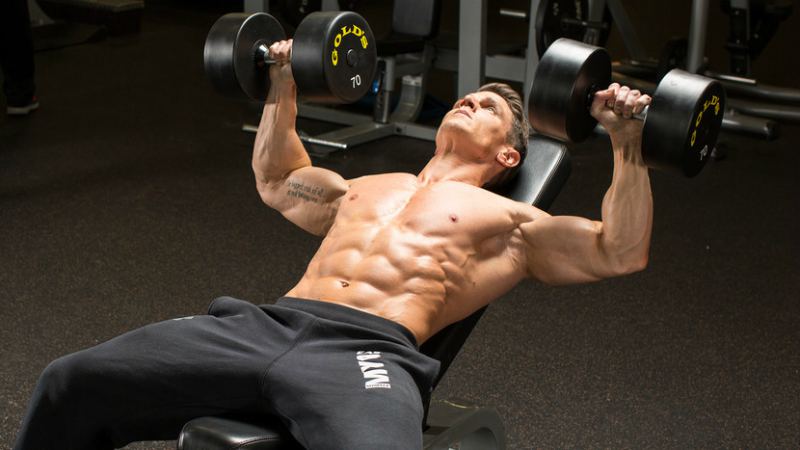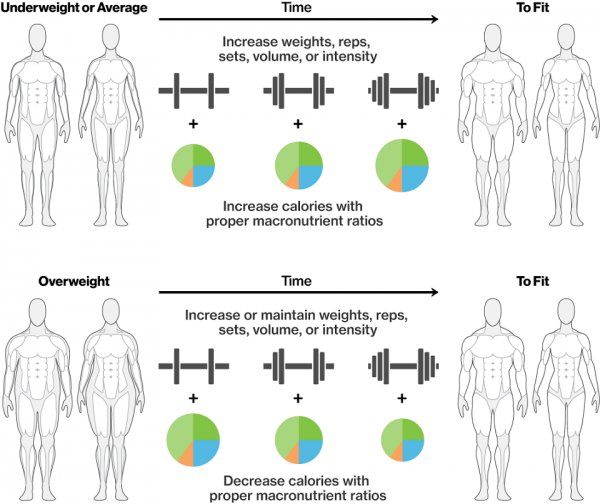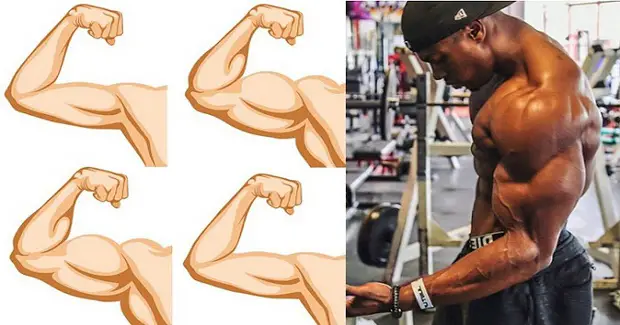When trying to create the most effective workout routine possible, your goal is to use the frequency, schedule, intensity, volume and exercise selection that is as optimal as possible for you and your goal.
If you do that correctly, you are pretty much guaranteed to get the best results you can get. Unless of course you happen to leave out the one component that matters more than everything else:
It’s the component that can turn the most perfect workout programme into a waste of time and literally make or break your success. It’s called progressive overload, and it is the absolute key to getting the results you want from your workout routine.

What Is Progressive Overload?
The body doesn’t care that you have a type of workout or exercise goal in mind. It doesn’t care that you want to:
- Build muscle.
- Lose fat.
- Tone.
- Become stronger.
- Improve performance.
Your body only knows and cares about keeping you alive and functioning as efficiently as possible. And, to ensure it meets this goal, your body is both smart enough and capable enough to do whatever is needed in order to adapt to its environment.
The only way your body will ever change or improve the way you want, is by creating an environment that proves to your body that these changes and improvements must be made. Your body will not change or improve unless you force it to.
No matter how perfect your workout is, muscle will not be built, strength will not be gained and performance will not improve, unless you show your body that these are things that absolutely need to happen in order for it to survive.

The Progressive Overload Principle:
- In order for a muscle to grow, strength to be gained, performance to increase, or for any similar improvement to occur, the human body must be forced to adapt to a tension that is above and beyond what it has previously experienced.
- If you lift the same weights, for the same number of reps, the same way for the next 20 years… nothing will ever happen. Your body will never change or improve in any way. You will only maintain your current state.
In order to increase the demands you are placing on your body you should:
- Increase the weight being lifted.
- Lift the same weight for more reps.
- Do something that increases the demands that your body needs to meet.
Your body will have no other choice but to make the necessary changes and improvements that will allow it to adapt to this environment and remain capable of performing these tasks.
And these changes, improvements and adaptations come in the form of:
- More muscle.
- More strength.
- Less fat.
- More toned.
- Better performance.
- The overall results you are looking to achieve.
That’s what all of these goals are, just our body’s adaptive response to the demands being placed on it through exercise. You’re showing your body that in order for it to survive, in order for it to do what you are forcing it to do, it’s going to need to make these changes and improvements.
An Example Of Progressive Overload:
Let’s pretend that right now you can lift 50lbs on some exercise for 3 sets of 8 reps. Now, if you continue to lift that same 50lbs for those same 3 sets of 8 reps for the next 20 years, you will not gain any new muscle or strength at all. Why? Because there was no progressive overload.
Your body has already adapted to this tension (50lbs for 3 sets of 8 reps) and has already provided you with exactly as much muscle and strength as you need to be able to perform this task on a regular basis.
Because you aren’t increasing the demands being placed on your body, you aren’t giving your body any reason to improve further. However, if you were to lift 50lbs for 3 sets of 9 reps (instead of 3 sets of 8 reps) on that same exercise, then a reason would finally exist.
Why? Simple, you increased the tension, you increased the demands, you increased the work your body had to do. Instead of doing the same 3 sets of 8 reps with 50lbs, you worked to do 1 additional rep on each of those sets.
And, while it may only seem like a tiny improvement, it’s exactly what you need to do in order to prove to your body that it needs to improve. Similarly, if you were to now try to lift 55lbs for 3 sets of 8 reps (an increase of 5lbs), the exact same type of reason would exist.
This Is Why Most People Fail:
It’s this lack of progressive overload that is easily the main reason most of the people who workout, look the same as they did when they first started working out. Men, women, young, old, fat, skinny, they are doing nothing to increase the demands being placed on their body. So, their body has no choice but to remain exactly the same.
This is fine if that’s your goal. If you’ve already reached the point where your body is perfect and it looks and performs exactly how you want it to. No more progressive overload is needed then since you just want to maintain your current condition.
But, until the day you reach that point, your primary focus must be on progressive overload.
Do I Need To Progress Every Single Workout?
No. In fact, doing so would be pretty much impossible, at least for a significant period of time. If we could, everyone would be lifting a million pounds for a million reps on every exercise. However, we should definitely have that mindset and strive to increase the demands being placed on our bodies as often as we possibly can.
Whether that happens every workout, or every other workout, or just once per month or less depends on a ton of individual factors specific to you and your goal. As long as you’re forcing progressive overload to take place in some form over time, then your body will continue to improve.




